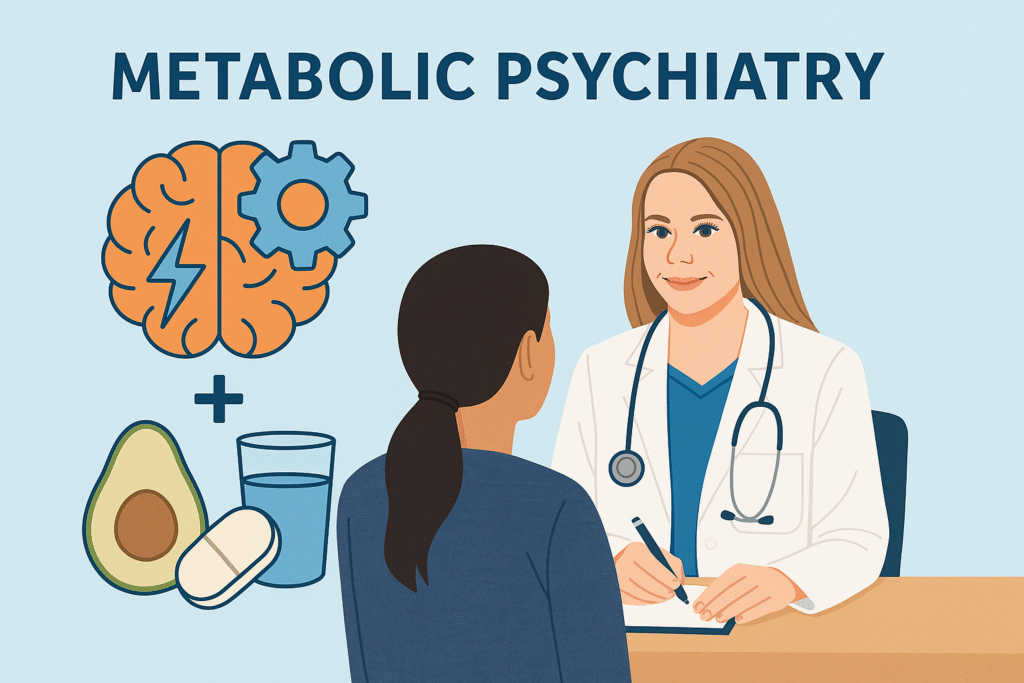Metabolic Psychiatry
Exploring the Mind–Body Connection in Mental Health
In recent years, the field of metabolic psychiatry has emerged as an exciting new approach to understanding and treating mental health conditions. Unlike traditional psychiatry, which focuses mainly on neurotransmitters and psychotropic medications, metabolic psychiatry emphasizes the role of metabolism, energy balance, and biochemical pathways in shaping psychiatric symptoms and overall brain health.
Defining Metabolic Psychiatry
Metabolic psychiatry views the brain as an organ deeply tied to the body’s metabolic processes. This approach suggests that disruptions in energy metabolism, mitochondrial function, insulin signaling, and nutrient pathways may contribute to the onset and severity of psychiatric conditions such as depression, bipolar disorder, schizophrenia, and anxiety (Barch, 2023).
Essentially, it asks: How does the way our body processes energy impact our mood, cognition, and resilience?
The Science Behind It
Tryptophan Metabolism and Mental Health
One of the most compelling areas of evidence in metabolic psychiatry involves tryptophan metabolism, a key pathway for producing serotonin and kynurenine metabolites. Alterations in this pathway have been linked to neuroinflammation, oxidative stress, and excitotoxicity, all of which are implicated in psychiatric disorders. Research highlights the possibility of mechanism-oriented therapies targeting tryptophan metabolism as a way to improve neurological and psychiatric outcomes (Li et al., 2022).
Metabolic Dysfunction and Psychiatric Disorders
Disruptions in glucose metabolism, lipid regulation, and mitochondrial efficiency have also been associated with psychiatric illness. A growing body of evidence shows that metabolic disturbances can worsen symptoms and may even serve as risk factors for developing conditions like cognitive decline, depression, and schizophrenia. Addressing these metabolic changes—through lifestyle interventions, diet, or targeted treatments—could represent a breakthrough in psychiatric care (Atti, 2024).
Integrative and Preventive Potential
Metabolic psychiatry doesn’t seek to replace traditional psychiatry but to expand it. By integrating metabolic health into psychiatric treatment, clinicians can develop more personalized and preventive strategies—for example, using nutritional psychiatry, exercise interventions, or medications that improve metabolic and brain function simultaneously (Barch, 2023).
The Value of Combining Medications and Metabolic Psychiatry
While metabolic psychiatry highlights the role of diet, exercise, and biochemical pathways in mental health, medications remain a cornerstone of psychiatric care. The real power lies in combining these approaches—using both psychotropic medications and metabolic strategies to treat the whole person.
Psychiatric medications effectively reduce symptoms like mood instability, psychosis, or anxiety. However, many of these medications—such as antipsychotics and mood stabilizers—carry a risk of metabolic side effects like weight gain, insulin resistance, and cardiovascular risk. Left unaddressed, these complications can harm both physical health and treatment adherence.
Kwak and Kim (2022) showed that when psychiatric care is integrated with metabolic health management programs, patients not only improve in physical health but also experience greater psychiatric stability and quality of life. This reinforces the importance of dual, whole-person care.
Care Sync Psych’s Dual Approach
At Care Sync Psych, we embrace this philosophy by offering a dual approach to care that recognizes the bidirectional relationship between the mind and body. Mental health cannot be fully addressed without also considering physical health—and vice versa.
- Our psychiatric services provide evidence-based medication management and psychotherapy.
- Our metabolic psychiatry services focus on optimizing energy balance, reducing inflammation, and promoting long-term health through nutrition, lifestyle, and integrative interventions.
By syncing these two dimensions of care, we treat more than just symptoms—we help patients move toward whole-person wellness, where both body and mind are in balance.
Conclusion
The evidence is clear: metabolism and mental health are deeply connected. By exploring pathways like tryptophan metabolism and addressing metabolic dysfunction, metabolic psychiatry offers a transformative way forward. Combined with traditional psychiatric care, it creates a comprehensive, holistic framework that improves outcomes and empowers patients.
At Care Sync Psych, our mission is to help patients achieve this balance by integrating mind and body care—because true healing happens when the two are in sync.
References
Atti, A. R. (2024). Exploring the association between metabolism and psychiatric disorders. Frontiers in Psychiatry, 15, 1456763. https://doi.org/10.3389/fpsyt.2024.1456763
Barch, D. M. (2023). Metabolic psychiatry. Biological Psychiatry Global Open Science, 3(4), 580–581. https://doi.org/10.1016/j.bpsgos.2023.08.017
Kwak, Y. B., & Kim, J. Y. (2022). Development and evaluation of an integrated health management program for psychiatric patients with metabolic syndrome. Journal of Korean Academy of Nursing, 52(3), 261–277. https://doi.org/10.4040/jkan.21222
Li, D., Yu, S., Long, Y., Shi, A., Deng, J., Ma, Y., … & Ao, R. (2022). Tryptophan metabolism: Mechanism-oriented therapy for neurological and psychiatric disorders. Frontiers in Immunology, 13, 985378.https://doi.org/10.3389/fimmu.2022.985378
